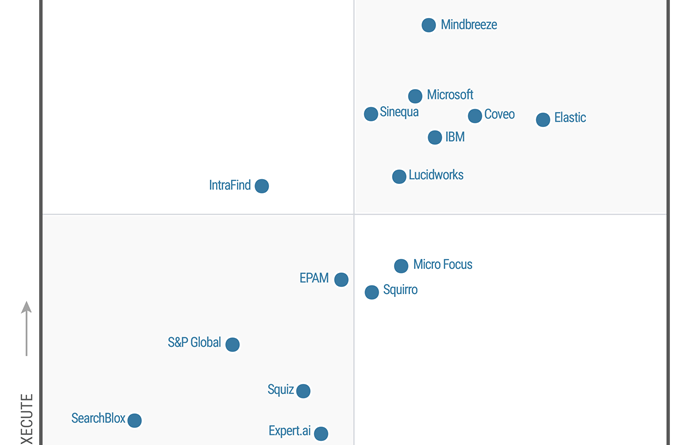Microsoft named a Leader in 2022 Gartner® Magic Quadrant™ for Insight Engines
How your organization can benefit, no matter the industry.
As the amount of data being generated continues to grow at an exponential rate, it's becoming increasingly important for organizations to have a rich set of tools that can help them make sense of it all. That's where insight engines come in. These powerful solutions apply relevancy methods to data of all types, from structured to highly unstructured, allowing users to describe, discover, organize, and analyze it to deliver information proactively or interactively at the right time, in the right context.
Microsoft has recently been named a Leader in the 2022 Gartner Magic Quadrant for Insight Engines, a report that evaluates the capabilities of various vendors in the market.
Microsoft offers two integrated solutions in this space: Microsoft Search, which is available with Microsoft 365, and Azure Cognitive Search, which is available as a platform as-a-service (PaaS) with Microsoft Azure. These solutions are designed to help professionals and developers build impactful AI-powered search solutions that can solve complex problems and enhance the customer experience by enabling information discovery across the spectrum from unstructured to structured data. Whether you need a turnkey solution to reason over enterprise data or the flexibility to tailor search to specific scenarios, Microsoft has you covered.
Azure Cognitive Search can be used in a variety of industries to improve efficiency and decision-making. Some specific examples of how it can be used include:
- Manufacturing: Cognitive Search can be used to help manufacturers quickly find information about production processes, equipment, and materials. It can be applied to structured data scenarios such as part catalogs as well as unstructured content such as equipment manuals, safety procedures, and imagery.
- Energy: Cognitive Search can be used to quickly find information related to exploration, drilling, and production. Geo-location search combined with traditional search input enables discovery experiences to get the most of past and present geological site studies, and extensibility allows incorporating energy industry-specific information.
- Retail: Cognitive Search can be used to develop a powerful product catalog search experience for retail web sites and apps. Customizable ranking options, scale capability to handle peak traffic with low latency, and the ability for near-real time updates for critical data such as inventory make it a great fit for the scenario.
- Financial services: Cognitive Search can be used by financial institutions to quickly find data related to investments, market trends, and regulatory compliance. Its sophisticated semantic ranking and question-answering capabilities can enable users to answer business questions faster and more confidently.
- Healthcare: Cognitive Search can be used by healthcare organizations to improve patient care, streamline operations, and make better informed decisions by quickly finding and accessing relevant information within electronic medical record systems, providing real-time access to clinical guidelines and evidence-based best practices.
Nearly every user knows what to do when they see a search box. All SaaS applications targeting audiences from consumer to enterprise can greatly benefit from a great search experience over their own data. Azure Cognitive Search can deliver an out-of-the-box solution, inclusive of various multi-tenancy strategies, support for over 50 languages, and a global presence to ensure your solution is delivered in the right location for your customers.
If you're a technical decision maker in one of these industries, or any other industry, and you're interested in learning more about how Microsoft's cognitive search solutions can help you unlock the full potential of your data, you can visit the Azure Cognitive Search website and the Microsoft Search website.
You can also download a complimentary copy of the Gartner Magic Quadrant for Insight Engines to see how Microsoft is recognized in the space.
Gartner is a registered trademark and service mark, and Magic Quadrant is a registered trademark of Gartner, Inc. and/or its affiliates in the U.S. and internationally and are used herein with permission. All rights reserved.
This graphic was published by Gartner, Inc. as part of a larger research document and should be evaluated in the context of the entire document. The Gartner document is available upon request from Gartner Reprint.
Gartner does not endorse any vendor, product or service depicted in its research publications, and does not advise technology users to select only those vendors with the highest ratings or other designation. Gartner research publications consist of the opinions of Gartner’s research organization and should not be construed as statements of fact. Gartner disclaims all warranties, expressed or implied, with respect to this research, including any warranties of merchantability or fitness for a particular purpose.
Source: Azure Blog Feed

